Dual Enrollment
The District wants Dual Enrollment:
Do we?
Faculty raise concerns with a Board Member, but he and the District administration still strongly support increasing Dual Enrollment programs at high schools
By Tim Maxwell, CSM English Professor

Tim Maxwell
In 2007, the year I was hired, several of my new colleagues in CSM’s English department–including Daniel Keller, Merle Cutler, and James Caranza–climbed into Madeleine Murphy’s minivan and drove the short distance to the District Office for a meeting with previous Chancellor Ron Galatolo. We had been stirred into action by the district initiative to expand Concurrent Enrollment–which, at the time, consisted only of Middle College and high school students electing to take regular college courses–from our campuses into local high schools, debuting Dual Enrollment (DE), which essentially licenses high schools to offer our credit for our courses even though they would be taught in any area high school by anyone with minimum qualifications. It seemed to us then as it does to many faculty now a fraud. In a heated discussion, we raised many of the same issues we have with the program today and the former Chancellor listened, growing more and more agitated but offering no reassurance that he was interested in preserving the integrity of our colleges. Dismissing us, he declared simply, “It’s here!”
We argued that Dual Enrollment only offers a nominal college experience–and one that effectively cancels out the authentic one they could have, thus depriving them of learning at both the high school and college levels. Especially, as the data show Dual Enrollment is underutilized by lower-income students of color, how, we asked, does it serve equity? x x |
At the time, in fact, the initiative seemed to go nowhere, which I liked to think we had something to do with. Resistance to the idea was firm–and not limited to those of us taking a stand–and the former Chancellor dropped it. Expressing his exhaustion with the fight but feeling like we’d won, one faculty member wrote in an email: “They don’t have high school faculty on board; other departments are opposed to it and many more will be as this blows open; we are in charge of hiring; our student gov. doesn’t support it; CSM Speaks [a college-sponsored climate survey] is evidence against it; COI [now Committee on Instruction] will get involved, and I doubt, seriously, that people on that committee will allow it…I think it will die a slow death on its own.” He was right that it died, but it appears we were naive to think we could abandon our resistance. Today, Dual Enrollment-–this “revolutionary” scheme to render the difference between high school and community college meaningless to boost enrollment-–truly is here.
Administrators, boards, and legislators across the country praise Dual Enrollment
In fact, it is widespread, not just in our district and our state but all across the country; it will soon be virtually everywhere. Administrators, boards, and legislators at the local, state, and even federal levels parrot the same arguments about the supposed virtues of DE, especially the claim that it will serve our most underserved students by providing them with an accelerated, less expensive, and more efficient way to complete college. The US Department of Education concludes in a blog post lavishing praise on DE:
We believe that the upheaval and crises the pandemic engendered present us with the urgent opportunity now to transform how our young people transition from high school, to and through college, and into rewarding careers through deliberate integration and alignment across secondary, postsecondary, and work. The work we do today to build more equitable dual enrollment career pathways will lead our students to a bright future.
Despite the appeal of this model to neoliberal managers determined to increase “throughput,” as community college educators, we must insist on providing all students who choose our institution a true college education.
Faculty discuss Dual Enrollment issues with Trustee John Pimentel

Board of Trustees .Member John Pimentel
On January 18th, AFT 1493 Co-Vice President Katharine Harer arranged a meeting between DE enthusiast and SMCCCD Trustee John Pimentel and a half dozen DE-concerned faculty to discuss some of the issues I raised in the December 2022 Advocate as well as the Trustee’s reasons for supporting the program, put simply that it would increase enrollment and provide students with a less expensive and more easily accessible college pathway. I do credit the trustee for choosing not to include Aaron McVean, the District DE lead, so that he could hear the faculty perspective, and for taking the time to read my article in advance. He also listened to us intently and respectfully.
While Nick Kapp, a biotech professor at Skyline, discussed his mostly positive experiences overseeing and mentoring high school teachers in several different high schools, most of us made strong and compelling arguments against this headlong rush into DE, emphasizing many of the unresolved issues with academic integrity, oversight, quality of education, and staffing.
Faculty support high school students taking college classes on campus or online taught by our faculty
We made it clear that we support Concurrent Enrollment and Middle College–two opportunities for high school students to earn credit for college coursework–because they both require students to join regular, adult college students on campus, online, or at open-enrollment satellite campuses staffed by our faculty. Everyone benefits. First, the high-school-age students, who feel ready to move beyond not only high school curriculum but also culture, benefit because they get to have an authentic college experience in classes pitched for adults, alongside more mature classmates. The adult students benefit from the presence of these younger students who tend to be highly motivated to learn. The professors benefit from these mixed classes because they may continue designing instruction for adults while also enjoying the perspectives these students bring to discussions. The college benefits by increasing enrollment as well as increasing the likelihood these students will continue once they’re done with high school rather than taking their units elsewhere when they apply to transfer.
We argued that Dual Enrollment, on the other hand, only offers a nominal college experience–and one that effectively cancels out the authentic one they could have, thus depriving them of learning at both the high school and college levels. Especially, as the data show Dual Enrollment is underutilized by lower-income students of color, how, we asked, does it serve equity?
Who will teach dual enrollment classes at high schools if program is expanded widely
At the meeting, we raised the question of who ultimately will teach these classes if the program is allowed to expand to as many as 16 feeder schools. A legion of DE-dedicated adjuncts? High school teachers with minimum qualifications? Any of us? When asked whether divisions, departments, or individual faculty could opt out, Trustee Pimentel asserted that the District would maintain the right of assignment. This means that any of us might find ourselves teaching in high school no matter what we were trained for or chose for our careers. Overall, he seemed less interested in discussing the issues that we were raising about the nature of the program – the pedagogical and philosophical concerns – than negotiating practical questions like mileage pay for faculty.
At the conclusion of the meeting, Trustee Pimentel acknowledged that the meeting had made him think “more deeply” about DE than he had before and he thanked us for our time. Katharine, who’d been facilitating, asked if based on the discussion, he’d “put the brakes on it.” He replied, “No, I still see it as a net benefit for everyone.” In other words, “It’s here.” This time for real.
Do you have another perspective on dual enrollment? The Advocate encourages readers to comment on this article on AFT 1493’s Discord server. Click here to comment.
How to join Discord: (1) create an account and download the app. (2) request to be added to our AFT1493 server. Want to learn more? See this beginner’s guide to Discord for more information.
We would also like to publish a range of views on the topic of dual enrollment and other issues of importance to faculty in our district. Please submit your article for publication to The Advocate Editor Eric Brenner at brenner@aft1493.org
